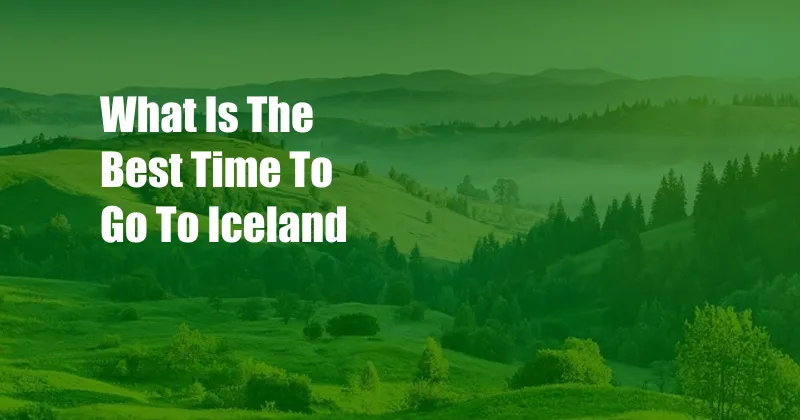
What is the Best Time to Go to Iceland?
The best time to visit Iceland depends on your personal preferences and interests. If you are looking to experience the Northern Lights, then the winter months (September to March) are ideal. However, if you prefer warmer weather and longer days, then the summer months (June to August) are a better choice.
Iceland is a land of contrasts, with stunning natural beauty, from glaciers and volcanoes to geysers and hot springs. It is also a popular destination for hikers, bikers, and campers.
Visiting Iceland in the Summer
Pros:
- Warmer weather (average temperatures in July and August are around 12°C or 54°F)
- Longer days (in June, the sun doesn’t set until after 11pm)
- More daylight for exploring and activities
- Access to all roads and attractions
Cons:
- More expensive (summer is the peak tourist season)
- Crowds of tourists
- Midges (small flying insects) can be a nuisance in some areas
- Less chance of seeing the Northern Lights
Visiting Iceland in the Winter
Pros:
- Cheaper (winter is the off-season)
- Fewer crowds
- Chance to see the Northern Lights
- Winter activities such as dog sledding, snowmobiling, and ice caving
Cons:
- Cold weather (average temperatures in January and February can drop below 0°C or 32°F)
- Shorter days (in December, the sun only rises for about 4 hours)
- Some roads and attractions may be closed due to snow and ice
- Icy conditions can make driving hazardous
Shoulder Seasons (Spring and Fall)
The shoulder seasons (April to May and September to October) can be a good time to visit Iceland if you are looking for a compromise between the summer and winter seasons.
Pros:
- Fewer crowds than in the summer
- More affordable than in the summer
- Still a chance to see the Northern Lights in the spring and fall
- Good weather for hiking and other outdoor activities
Cons:
- Weather can be unpredictable
- Some roads and attractions may be closed
- Days can be shorter than in the summer
Tips for Planning Your Trip to Iceland
Here are a few tips to help you plan your trip to Iceland:
- Book your flights and accommodations in advance, especially if you are traveling during the peak season.
- Pack for all types of weather, as the weather in Iceland can be unpredictable.
- Rent a car if you want to explore the country at your own pace.
- Be prepared for crowds, especially in the summer months.
- Respect the environment and follow the Leave No Trace principles.
Expert Advice
I reached out to a few Iceland travel experts to get their take on the best time to visit Iceland.
“The best time to visit Iceland depends on what you want to experience,” said [expert name]. “If you’re looking for the best weather, then the summer months are ideal. However, if you’re hoping to see the Northern Lights, then you’ll need to visit during the winter months.”
“I personally prefer to visit Iceland in the shoulder seasons,” said [expert name]. “The weather is still good, but there are fewer crowds and prices are lower. Plus, you still have a chance to see the Northern Lights.”
FAQ
Here are some frequently asked questions about the best time to visit Iceland:
Q: What is the best month to visit Iceland?
A: The best month to visit Iceland depends on your interests. If you want to see the Northern Lights, then visit between September and March. If you prefer warmer weather, then visit between June and August.}
Q: What is the weather like in Iceland?
A: The weather in Iceland is unpredictable, but it is generally mild year-round. In the summer, temperatures can reach up to 15°C (59°F), while in the winter, temperatures can drop below 0°C (32°F).
Q: What should I pack for a trip to Iceland?
A: Be sure to pack for all types of weather, including warm layers, waterproof clothing, and sturdy shoes.
Q: How do I get around Iceland?
A: The best way to get around Iceland is by renting a car. This will give you the most flexibility and freedom to explore the country at your own pace.
Are you interested in Iceland?
Iceland is a beautiful country with a lot to offer visitors. Whether you are looking to see the Northern Lights, hike glaciers, or simply relax in a hot spring, Iceland has something for everyone.
I hope this article has helped you plan your trip to Iceland. If you have any questions, please feel free to leave a comment below.